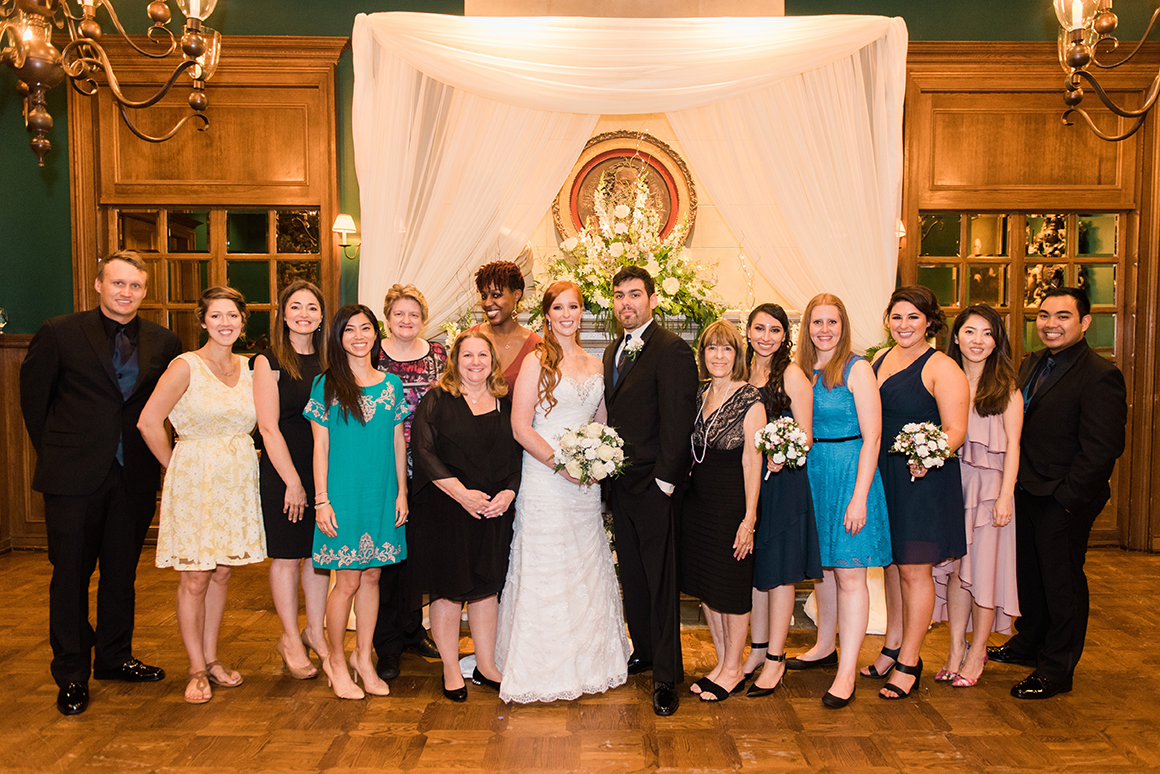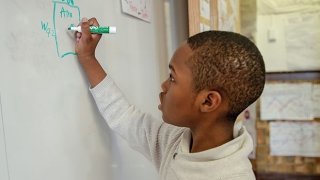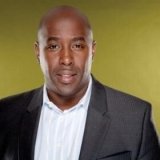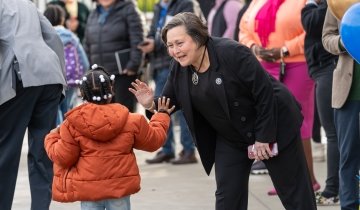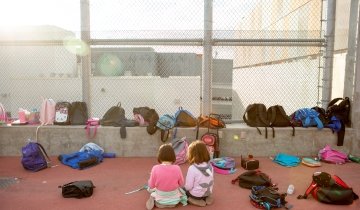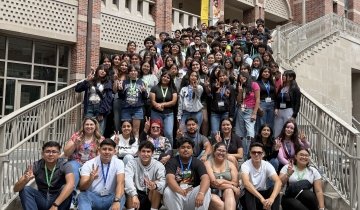Too early on a cold February morning, dozens of math and computer science teachers stream into a downtown Los Angeles office building, shaking rain from their umbrellas and rubbing sleep from their eyes.
Stiff from their commutes and from long weeks of leading classrooms, they’ve signed away their first Saturday of almost every month for five years or more to be here—and they couldn’t be happier.
They’re Math for America Los Angeles teachers, and they see the program as a resource, a network and a lifeline.
During the day’s professional development, it’s obvious how deeply they all care about their subject, their students and one another.
Math for America seeks to better recruit and retain exceptional math teachers. It’s the brainchild of billionaire philanthropist Jim Simons, who launched the program in New York City in 2004. The most successful of its offshoots, Math for America LA started in 2008 in partnership with the USC Rossier School of Education, Harvey Mudd College and Claremont Graduate University, and is funded by private donations, philanthropic foundations and the National Science Foundation.
Although some things about the program and its participants have changed over the years—Claremont Graduate University no longer participates; computer science has been added—much remains the same.
For a decade now, MfA LA has provided teachers with development opportunities as well as professional, personal and even financial support.

Current early-career MfA LA teachers receive:
› Salary support stipends ($10,000 annually)
› In-depth coaching and mentorship
› Travel funding for conferences
› Assistance in becoming certified by the National Board for Professional Teaching Standards
Master teachers (those with four or more years of experience) receive the same, as well as the opportunity to have MfA LA buy out one of their daily class periods so they can work on a self-designed project. For all participants, MfA LA stays highly connected with their schools and encourages as much clustering as possible, so that program participants ideally have a partner in a nearby classroom.
From the beginning, MfA LA’s steering committee has included Karen Symms Gallagher, Emery Stoops and Joyce King Stoops Dean of USC Rossier; Maria Klawe, president of Harvey Mudd College (HMC); Pam Mason, executive director and 35-year veteran LAUSD teacher; and Darryl Yong, professor of mathematics at HMC.
“This is a phenomenal program, rooted in building up, getting evidence and feeding long-term evaluation back in,” says Gallagher. “The team knows math and couldn’t be more committed to the work or to one another—that is the bottom line.”
All this stability, institutional knowledge and self-reflection may help explain the program’s success. Since 2010, an outside team led by Rebecca M. Eddy of Cobblestone Applied Research & Evaluation has done annual reviews of the program, and kept tabs on all the teachers who have ever participated in MfA LA. (A different company evaluated the program during its first two years.)
In its first decade, MfA LA provided 179 five-year teaching fellowships and reached 120,000 students in 119 schools in 31 districts. It also posted exceptional retention numbers.
“Nearly ninety percent of our fellows are still in the classroom after three years,” Mason says. “For math and science, that’s compared to 75 percent staying in nationally and 61 percent in LAUSD.”
Math is critical to students’ futures. According to MfA LA, the highest math courses high school seniors take determine not only what career paths will be open to them, but also what kind of higher education options they will have—if any.
Unfortunately, U.S. students are struggling: According to LAUSD’s 2018 Smarter Balanced Assessment, only 28 percent of eighth-grade students met or exceeded standards for math achievement; the year before, only 33 percent of the nation’s eighth-grade students performed at or above “proficient” in math.
The people best positioned to tackle these problems head-on are the ones in front of the classroom. But it’s challenging to be a teacher, period, let alone an effective one, especially early in a career or while teaching in a high-needs school. Plus, there’s a shortage.
“It’s estimated that the U.S. will need another 100,000 math and science teachers by 2020 to ensure that American students are prepared for the 21st-century workplace,” Klawe says.
“We need more highly effective and joy-inducing teachers of mathematics and computer science,” Yong adds. “That’s where Math for America LA comes in. We firmly believe that happy, fulfilled teachers who are lifelong learners ultimately lead to happy, fulfilled students who are lifelong learners.”
Underpinning it all is the incredibly supportive community that’s made MfA LA a nationwide leader.
“Our teachers go to conferences together, have meals together, stay in rooms together. It’s a large group, but you can see how small it really feels when they’re together,” says Mason. “They’re not just colleagues, but a family.”
Mason means it, too. She let one MfA LA fellow facing family health issues move in with her for a year; Mason and her husband then served as the young woman’s godparents at her wedding.
Later, Mason and her husband were asked to walk down the aisle at a wedding of another couple, Michele Widener Nieves ’13 MAT ’14 and Hector Nieves MAT ’14, who met in the program.
“I don’t know where we would be without MfA LA,” Michele says. “It gave us everything.”
“Even though my cohort and I were all in different classrooms, we bonded so much over sharing our experiences,” Hector says. “I honestly don’t think I would still be teaching if it weren’t for MfA LA, because I really struggled during my first couple of years.”
Adds Mason: “We do a lot more than the teaching aspect at MfA LA. We know they’re all in different situations, and their lives will inevitably keep changing, but it means a lot to be able to help young teachers with any problems or issues they have. Our goal is to keep them in the teaching profession, getting stronger all the time.”
All of this can best be seen on display about eight Saturdays a year, when MfA LA teachers meet for all-day mandatory professional development sessions to reconnect with, learn from and teach one another.
Outside coaches bring in special lessons—a highlight from a recent session was an interactive Lego-based approach to teaching binary number systems presented by two HMU professors—and there’s a special block devoted to wellness groups: a book club, a yoga class, an emotional support therapy session.
So successful have these professional development sessions been that Vanderbilt University’s Professor of Mathematics Education and Director of Graduate Studies Ilana Horn wrote a four-year grant to study them.
“MfA LA is an incredible resource for Los Angeles and the field of mathematics education,” she says. “We are learning a lot about what makes teaching math for understanding hard to do, as well as getting a grasp on how to support it.”
Not only do Horn and her team visit monthly, but Mason and Yong also travel to Tennessee for advisory board meetings. It’s all part of a virtuous circle of analysis, communication and continuous improvement that defines and differentiates MfA LA—and reminds everyone involved just how high the real-life stakes from this work really is.
“Unlike a lot of other academic areas, if students don’t have access to good mathematics education at school, it is hard to fill the gaps—too often, math classes serve as a filter rather than a pump,” Horn says. “Yet we know so much about how to get more kids to be successful—and happy—in math class. Teachers are the key in making that a reality, and the talented, committed teachers of MfA LA have been open, curious and really receptive to learning with us.”
These teachers put everything they’re learning into practice every day. The reaction from their schools has been overwhelmingly positive.
Elizabeth Hicks EdD ’18 is the principal of the Girls Academic Leadership Academy, Dr. Michelle King School for STEM. For her first two hires, she chose MfA LA’s Ashley Purpura Fernandes MAT ’14 and Michele Nieves.
“Many of our parents have remarked that before our MfA LA teachers, their daughters did not think they were good at math, but now, not only are they good at it, but they like math,” says Hicks. “Thanks to these teachers, we also started a mathletes program and launched a tradition of celebrating Pi Day across the school with students and parents.”
Math for America LA’s professional development session on Feb. 2 is a little out of the ordinary—stormy weather fills the windows on the USC City Center’s sixth floor; rain rattles the glass.
None of the math and computer science teachers in the room seem to notice, though—every seat in the room is full, and all eyes are intently locked on Michele and Hector Nieves’s breakout session presentation, “Incorporating Self-Assessment Into Master-Based Grading.”
“When we’re finished,” Hector says, in a smooth, practiced classroom-teacher voice, “Mrs. Nieves will share some assessment sheets.”
For a second, everything pauses as a smile slowly lights up everyone’s face, like friendly flickering electricity. Maybe it’s the mark of great peers as well as great teachers: fellow strivers who share ideals and a journey, radiating affection and intellectual curiosity. It’s palpable, their desire to teach and be taught, all in service to one another, to countless students, to the idea of a better future for all.
“I think you can call me Michele.” She grins, clicking on to the next slide. “After all, we’re with our friends.”
Everyone in the room laughs, then leans forward to learn more.
A SPIN-OFF?
What MfA LA’s done for math represents other interdisciplinary possibilities, says Darnell Cole, co-director of the USC Rossier Center for Education, Identity and Social Justice.
“We’re exploring the idea of a program that targets students who have a love for physics and/or astronomy and would be interested in a direct pathway into teaching these subjects at the K–12 level,” he says. “There’s a high need for these kinds of teachers, and this could also be an excellent opportunity to help empower greater numbers of women and minority students to enter and succeed in the sciences. Stay tuned.”
Harvey Mudd College Professor Darryl Yong has been a part of MfA LA since the beginning.
“We have tried to create a holistic support system for teachers that respects them as professionals and individuals; to design coherent sets of programs that align with on-the-job expectations and contexts; and to integrate professional learning with coaching and mentoring to provide timely feedback.
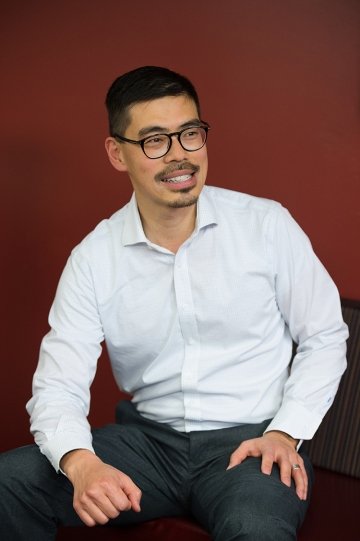
“While giving our efforts enough time to take root, we want to pay close attention to educational research and our own external evaluators to improve—all within a close-knit, caring community.
“We want students to have uniform access to excellent educational experiences in math and computer science, and for teachers to persist in the profession while growing and honing their craft.
“We invite the USC Rossier community to visit one of our professional development meetings to see how all of the pieces of our programs mesh together—and to partner with us in the work!”
1 + 1 + MfA LA = FAMILY
Most middle-school romances don’t last the year—or even past lunch.
“In eighth grade, I fell in love with math because it explains everything about the world,” says Michele Widener Nieves ’13 MAT ’14. “When I realized I could help people see these patterns and make them come to life, I knew I was going to be a teacher.”
Years later, math made another great love possible, when she married Hector Nieves MAT ’14 in July 2017.
After meeting by chance in their MfA LA group interview in 2013, they completed the program together and wound up teaching at the same school. One fateful first date of bowling later—Michele won—they became an item.
“The very first day of the MfA LA program, they took a walk-and-talk picture of us, and we didn’t know what to talk about, so we looked really awkward,” laughs Michele. “We imitated that in our engagement photos, and had them side by side at our wedding.”
It’s no surprise then that they included so many of their colleagues—their friends—on that special day.
“Because of MfA LA, I moved to Los Angeles from New York. I struggled coming out here by myself—I struggled just to get by, really—but meeting this group changed my life,” Hector says. “I’m so grateful to have met these incredible people … one in particular, most of all.”
